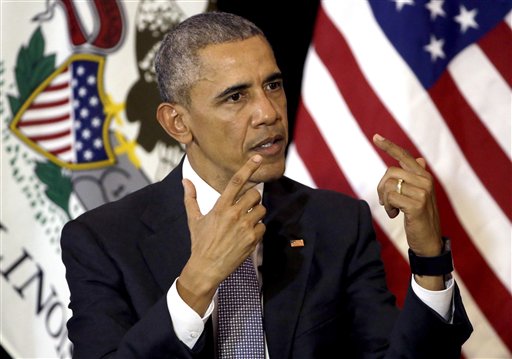- California Assembly OKs highest minimum wage in nation
- S. Korea unveils first graphic cigarette warnings
- US joins with South Korea, Japan in bid to deter North Korea
- LPGA golfer Chun In-gee finally back in action
- S. Korea won’t be top seed in final World Cup qualification round
- US men’s soccer misses 2nd straight Olympics
- US back on track in qualifying with 4-0 win over Guatemala
- High-intensity workout injuries spawn cottage industry
- CDC expands range of Zika mosquitoes into parts of Northeast
- Who knew? ‘The Walking Dead’ is helping families connect
GOP jeopardizing judicial integrity with Garland

President Barack Obama responds to questions at the University of Chicago Law School, where he taught constitutional law for over a decade in Chicago, Thursday, April 7, 2016
CHICAGO (AP) — President Barack Obama accused Senate Republicans on Thursday of jeopardizing the “integrity of the judicial branch” by refusing to consider his “extraordinary” nominee to the Supreme Court.
Holding court before Chicago law students, Obama argued that the treatment of judge Merrick Garland will cause the public to lose confidence in the ability of courts at all levels of government to fairly judge cases and resolve controversies.
“Our democracy can’t afford that,” Obama said.
Obama introduced Garland, chief judge of the U.S. Court of Appeals for the D.C. Circuit, three weeks ago at the White House, but the nomination had stalled long before that sunny March day in the Rose Garden.
Senate Majority Leader Mitch McConnell, R-Ky., had announced hours after Justice Antonin Scalia’s death in February that the Senate would not hold hearings or vote on any nomination Obama sent to Capitol Hill in an election year.
Obama said that stance is jeopardizing democracy by leading to potential 4-4 ties on cases from the Supreme Court. He also said there potentially are two terms in which the high court will have to issue rulings without a tie-breaking justice.
Obama described that scenario as unprecedented and said the courts have become a troubling extension of America’s broken politics.
“That erodes the institutional integrity of the judicial branch,” Obama told about 300 students, faculty and judges at the University of Chicago Law School, where he taught constitutional law for more than a decade. “At that point, people lose confidence in the ability of the courts to fairly adjudicate cases and controversies and our democracy can’t afford that.”
On the Senate floor Thursday, McConnell said Obama would “be telling supporters a politically convenient fairy tale” by arguing that the Constitution requires a Senate vote on his nominee.
Garland has been meeting with Democratic and Republican senators on Capitol Hill, but there is no indication the sessions are influencing the political calculus of the Senate Republican leadership.
He met Thursday with four Democrats: Sens. Heidi Heitkamp of North Dakota, Sherrod Brown of Ohio, Chris Coons of Delaware and Richard Blumenthal of Connecticut. Blumenthal, after his meeting, urged more Republicans to meet with Garland.
“He will be a unifying force if confirmed,” Blumenthal said.
Most GOP senators, including McConnell, have said they will not meet with Garland, though Judiciary Committee Chairman Chuck Grassley of Iowa has invited the judge to meet over breakfast Tuesday. Garland will meet with other Republicans next week, including Sens. Kelly Ayotte of New Hampshire, Rob Portman of Ohio, Lisa Murkowski of Alaska and Jeff Flake of Arizona, the White House said. And South Carolina Sen. Lindsey Graham’s office said Thursday that he was willing to meet with the nominee.
Sen. Mark Kirk of Illinois, a Republican regarded as one of the most vulnerable incumbents seeking re-election in November, was the first GOP senator to meet with Garland. Kirk is Garland’s home-state senator and one of a few Republicans to call for hearings on his nomination.
Kirk on Thursday tweeted a photo of a handwritten note Obama sent thanking the senator for meeting with Garland late last month. Kirk tweeted that he met with the judge “because my responsibility to the people of (hashtag)IL is more important than partisanship.”
Obama has accused Republicans of blocking Garland for political reasons.
In the note to Kirk, Obama said: “Thank you for your fair and responsible treatment of Merrick Garland. It upholds the institutional values of the Senate, and helps preserve the bipartisan ideals of an independent judiciary.”
In Chicago, Obama answered some questions from students, including one who asked about the diversity Garland, who is white, would add to the court.
“Well, he’s from Skokie, (Illinois),” Obama joked. He noted that Garland follows his earlier nominations of Sonia Sotomayor, a Latina, and Elena Kagan, who is Jewish, to the high court. “When I look at Merrick Garland, yeah, he’s a white guy but he’s a really outstanding jurist. Sorry.”
The question reflected some of the disappointment among liberal groups who had urged Obama to use the vacancy to further expand diversity on the court. Obama had been urged to name the first African-American female justice, while others hoped to see the first Asian-American. Some have worried that Obama’s choice of a white man from the Midwest would deflate enthusiasm among the liberal base heading into November’s elections.
From Chicago, Obama is heading to California to raise money for Democrats at events through late Friday. He was joined on the trip by his daughter Malia, who is expected to start college in the fall.











